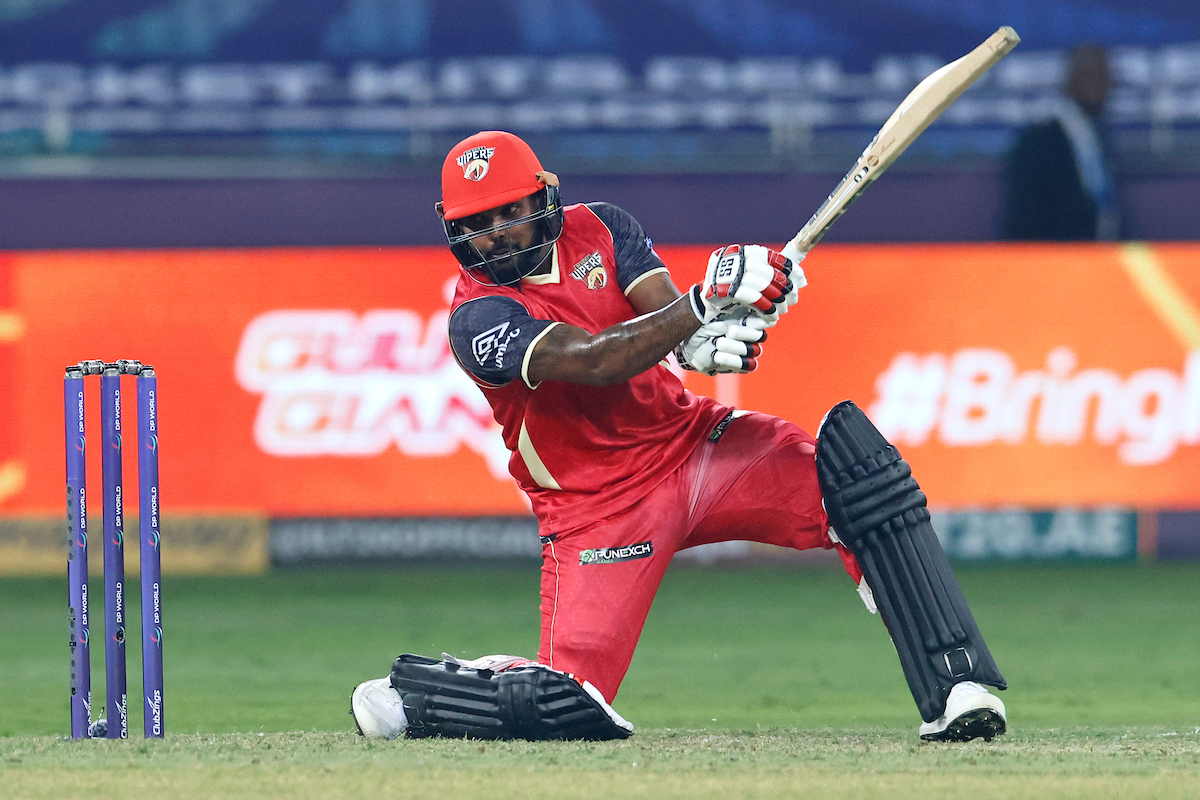Shaheen Afridi’s deadly spell of three wickets for 22 runs and breezy knocks from Wanindu Hasaranga and Azam Khan guided Desert Vipers to a six-wicket win over defending champions Gulf Giants in the seventh match of the DP World ILT20 Season 2 at the Dubai International Stadium. The clash of the finalists of the first edition saw Afridi’s spell restrict Giants to 160 for 6 in 20 overs.
Vipers won the match with eight balls to spare through Hasaranga’s 42 off just 19 balls with four boundaries and two sixes. He had put on 57 runs in 33 deliveries for the third wicket with Adam Hose. Afzal Khan then hit a breezy unbeaten 26 off 14 balls with three boundaries and a six. He too added 41 runs in 19 balls for the fourth wicket with Hose, who hit a sedate 39 runs off 35 balls with four boundaries. Vipers who were at the bottom of the table have now jumped to the fourth place.
For the Giants, Chris Lynn top scored with 63 runs off 42 balls with seven boundaries and three sixes. He put on 89 runs off 59 balls for the third wicket with Jordan Cox before Afridi put the brakes on the run flow. Cox hit 32 off 29 balls with a boundary and a six.
Vipers won the toss and chose to bowl. In the opening over, Pakistan T20 skipper Afridi, making his tournament debut, conceded a boundary to Jamie Smith over mid-off off the fifth ball. Mohammad Amir took a wicket in the second over, dismissing skipper James Vince for 1 as he lifted the ball to Colin Munro at mid-on. Afridi also claimed a wicket in the third over, clean bowling Smith for 5 after a missed big hit.
Lynn wiped away the impact of two early wickets by scoring two boundaries and a six off Tymal Mills. Cox played second fiddle as Lynn went for the big hits. Lynn reached his half-century in 35 balls with six boundaries and three sixes. When the Giants were four runs short of the 100-run mark, Mills made Lynn miscue his shot, and wicketkeeper Azam Khan caught the skier for 63.
Shimron Hetmyer, who joined Cox, got out caught behind for 10 off Hasaranga. After that, Afridi picked his second wicket, forcing Cox to hit to Alex Hales at long-on for 32. Chris Jordan became Afridi’s third victim, falling identically for 14. Usman Khan hit an unbeaten 16 to ensure his team a challenging total.
Needing 161 to win, Vipers lost an early wicket when Richard Gleeson, who came in as Super Sub in place of Lynn, got Colin Munro out caught at third man for 6. Hales on 11 escaped being stumped off a Mujeeb Ur Rehman slider but fell in the seventh over to Dominic Drakes to a spectacular catch by Aayan Khan at the fine leg boundary for 21.
Hasaranga who joined Adam Hose hit Aayan Khan for two consecutive boundaries and also Jordan for a six and a boundary off successive balls. At the half way mark, Vipers needed 85 runs to win. Drakes picked the valuable wicket of Hasaranga in the 13th over by getting him caught by Usman Khan at long-off for 42.
Azam Khan unleased his hard-hitting skills and whacked Jordan for a six to mid-wicket followed by three boundaries off Blessing Muzarabani in the 15th over. This reduced the target to a gettable 32 runs from the last five overs. Hose got out to Gleeson, caught behind for 39 but Sherfane Rutherford and Khan steered their team to the target.
Vipers skipper Colin Munro hailed Hasaranga and Afridi; “It was a team effort, winning the toss was a big favour. Hasaranga was just brilliant, what a player. When you come up against Gulf Giants, we need to have our plans in place. We have all the analysts in T20 cricket, but what’s most important is adapt to what is in front of you. Afridi was outstanding and has so much experience, he knows his skill and executes them really well.”
Giants skipper Vince lauded Hasaranga’s knock. “We started well with the ball, put the pressure on them, but the way Hasaranga came out and batted took the game away from us. We need to tidy up in all facets on the game. We can’t afford to have lull periods because quality opposition will make you pay.”
Player of the match Hasaranga said: “I bat at number 7 generally, but today I had a chance up the order so I tried to go on the attack. I like to have that all-rounder tag in front of my name, so happy to perform with the bat as well.”

 Entertainment4 months ago
Entertainment4 months ago
 Entertainment4 months ago
Entertainment4 months ago
 Entertainment4 months ago
Entertainment4 months ago











